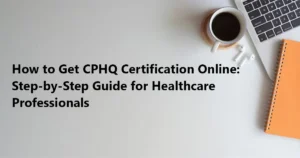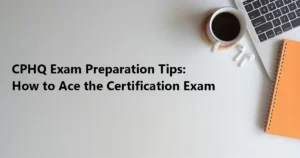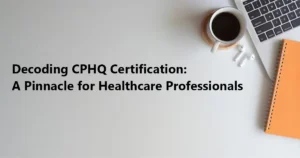Introduction to CPHQ Prep Exam
Brief overview of the CPHQ (Certified Professional in Healthcare Quality) exam
The Certified Professional in Healthcare Quality (CPHQ) exam is a pivotal certification for professionals in the healthcare industry, underscoring their proficiency in healthcare quality management. This certification, widely recognized and respected, is a testament to an individual’s commitment to ensuring and enhancing the quality of healthcare services. To ace the CPHQ exam, prospective candidates must grasp its fundamental structure and content. The exam comprises four core content areas, namely patient safety, healthcare quality improvement, information management, and case management, each playing a crucial role in evaluating a candidate’s comprehensive understanding of healthcare quality. Success in the CPHQ exam is not only a testament to one’s expertise but also a valuable asset for career advancement. As professionals seek effective CPHQ exam preparation tips, free resources such as CPHQ study materials and practice questions become invaluable tools. These free downloads aid in understanding the intricacies of the exam, allowing candidates to familiarize themselves with the question types and content. While the CPHQ certification is a significant investment, the question of whether it is worth it arises. The resounding answer lies in the numerous benefits it brings, including career advancement, increased job opportunities, and recognition as a leader in healthcare quality. As candidates navigate the preparatory phase, incorporating CPHQ practice questions and mock exams into their study routine is essential. These resources not only reinforce theoretical knowledge but also simulate the exam environment, allowing candidates to refine their test-taking strategies. Whether utilizing a comprehensive CPHQ prep package or seeking individual resources, the key lies in a balanced approach, incorporating various study materials and techniques to address personal strengths and weaknesses. Ultimately, the journey to acing the CPHQ exam is a multifaceted one, blending rigorous study, strategic preparation, and a commitment to excellence in healthcare quality.
Importance of the CPHQ certification in the healthcare industry
The Certified Professional in Healthcare Quality (CPHQ) certification holds unparalleled significance in the healthcare industry, serving as a hallmark of excellence for professionals dedicated to the enhancement of healthcare quality. The CPHQ certification is a testament to an individual’s expertise in critical areas such as patient safety, healthcare quality improvement, information management, and case management. Employers in the healthcare sector increasingly recognize and prioritize candidates with the CPHQ certification due to its role in ensuring optimal patient care, organizational efficiency, and overall quality improvement. The certification not only validates an individual’s knowledge but also signifies a commitment to maintaining the highest standards in healthcare delivery.
In the competitive landscape of the healthcare industry, possessing the CPHQ certification can significantly enhance one’s career prospects. It opens doors to a myriad of opportunities, from leadership roles in quality management to involvement in strategic initiatives aimed at improving healthcare outcomes. As professionals contemplate the pursuit of this certification, the question of whether it is worth the investment naturally arises. The answer is a resounding “yes.” The CPHQ certification is a recognized marker of professional achievement, contributing to increased job opportunities, career advancement, and a competitive edge in a dynamic and evolving healthcare environment.
For individuals seeking to embark on the journey towards earning the CPHQ certification, effective CPHQ exam preparation tips are crucial. Accessible and comprehensive resources, including free CPHQ study materials and practice questions, play a pivotal role in the preparation process. These resources not only assist in understanding the intricacies of the exam but also enable candidates to familiarize themselves with question types and content areas. Whether opting for a structured CPHQ prep package or leveraging individual study materials, integrating a variety of CPHQ practice questions and mock exams is essential for honing test-taking skills and reinforcing conceptual understanding.
Purpose of the article: Providing comprehensive preparation tips to ace the CPHQ exam
The primary purpose of this article is to offer aspiring healthcare professionals comprehensive and effective CPHQ exam preparation tips to successfully ace the certification exam. As the demand for healthcare quality management professionals continues to grow, the CPHQ certification has become increasingly essential for career advancement. This article aims to serve as a valuable resource by providing insights into strategic approaches, study techniques, and recommended resources to navigate the complexities of the CPHQ exam successfully.
In the pursuit of offering a holistic guide, this article will delve into various aspects, including the structure of the CPHQ exam, key content areas, and the significance of mastering crucial topics such as patient safety, healthcare quality improvement, information management, and case management. Through a detailed examination of each content domain, candidates will gain a deeper understanding of the exam’s nuances and be better equipped to tackle its challenges.

Moreover, this article emphasizes the accessibility of essential resources, including free CPHQ study materials and practice questions, catering to a diverse audience seeking valuable yet cost-effective preparation tools. The discussion will also address the common query of whether the CPHQ certification is worth the investment, shedding light on the numerous benefits it brings, such as increased job opportunities and recognition in the competitive healthcare landscape.
To facilitate a well-rounded preparation, the article will explore various study techniques, from active reading and note-taking to group study sessions, ensuring that individuals can tailor their approach to align with their unique learning styles. Whether candidates opt for individual study materials, a comprehensive CPHQ prep package, or a combination of both, the goal is to equip them with the necessary tools to tackle the exam with confidence.
Understanding the CPHQ Exam
Exam format and structure
Overview of the four content areas:
The CPHQ (Certified Professional in Healthcare Quality) exam comprehensively assessed candidates across four pivotal content areas, reflecting the multidimensional nature of healthcare quality management.
- Patient Safety: This content area places a spotlight on the paramount importance of patient safety within the healthcare landscape. Candidates are expected to showcase a deep understanding of the intricacies involved in preventing errors and adverse events that could potentially compromise patient well-being. This includes the ability to identify risks, implement proactive measures, and conduct thorough root cause analyses when incidents occur. Proficiency in patient safety not only reflects a candidate’s commitment to upholding the highest standards of care but also underscores their role in fostering a culture of continuous improvement where patient safety is prioritized at every level of healthcare delivery.
- Healthcare Quality Improvement: In the dynamic field of healthcare, quality improvement is an ongoing and integral process. Candidates are evaluated on their mastery of performance measurement techniques, benchmarking methodologies, and their familiarity with improvement frameworks such as Lean and Six Sigma. A comprehensive understanding of this content area signifies a candidate’s capability to contribute strategically to the enhancement of healthcare services. It highlights their role in driving systematic improvements, ensuring that healthcare organizations adapt to evolving standards and consistently deliver high-quality care to patients.
- Information Management: As healthcare becomes increasingly digitized, information management plays a pivotal role in decision-making and overall quality enhancement. In this content area, candidates are assessed on their proficiency in health information technology, data analysis, and interpretation. This involves leveraging technological tools to streamline processes, utilizing data for evidence-based decision-making, and ensuring compliance with privacy and security standards. A strong foundation in information management is indicative of a candidate’s adaptability to the evolving healthcare landscape and their capacity to harness data for the benefit of both healthcare providers and patients.
- Case Management and Care Coordination: Patient care extends beyond individual interventions, emphasizing the need for effective case management and care coordination. Candidates are expected to showcase their ability to facilitate seamless transitions of care, ensuring that patients experience continuity and consistency in their healthcare journeys. This involves collaboration with various healthcare professionals and teams to optimize resources, minimize gaps in care, and enhance the overall patient experience. Proficiency in case management and care coordination showcases a candidate’s dedication to patient-centered care and their capacity to navigate the complexities of the healthcare system to deliver comprehensive and cohesive services.
Question types (multiple-choice, multiple response, etc.)
The CPHQ (Certified Professional in Healthcare Quality) exam employs a diverse array of question types to comprehensively evaluate candidates’ knowledge and application of healthcare quality management concepts. Among the question types featured are the traditional multiple-choice questions, where candidates select the most appropriate answer from a list of options. This format assesses factual knowledge and the ability to make informed choices. Additionally, the exam may include multiple response items, which require candidates to choose multiple correct answers, offering a nuanced evaluation of their understanding of complex scenarios. Case-based questions may also be presented, allowing candidates to apply their knowledge to real-world situations. The inclusion of various question types ensures a robust examination that goes beyond rote memorization, testing candidates’ critical thinking and problem-solving skills in diverse contexts.
- Key Competencies and Skills Assessed by the Exam: The CPHQ exam is designed to assess a broad spectrum of key competencies and skills that are crucial for professionals in healthcare quality management. These competencies encompass a deep understanding of patient safety protocols, proficiency in healthcare quality improvement methodologies, adept information management skills, and the ability to coordinate and manage patient care effectively. Candidates are expected to demonstrate critical thinking, analytical skills, and a comprehensive grasp of the healthcare quality landscape. Effective communication and collaboration skills are also emphasized, as healthcare quality professionals often work in interdisciplinary teams. Mastery of these competencies ensures that individuals holding the CPHQ certification are well-equipped to navigate the complex challenges inherent in healthcare quality management.
- Scoring System and Passing Criteria: The scoring system of the CPHQ exam is designed to provide an accurate reflection of candidates’ knowledge and proficiency in healthcare quality management. While the exact details of the scoring system may vary, candidates typically receive a scaled score, with the minimum passing score established by the certifying body. The passing criteria are set to ensure that individuals earning the CPHQ certification meet a rigorous standard of competence in the field. Candidates are encouraged to familiarize themselves with the scoring system and passing criteria to understand the benchmarks they need to achieve for successful certification. This transparency in scoring contributes to the credibility and recognition associated with the CPHQ certification, establishing it as a rigorous and esteemed credential within the healthcare quality management profession.
Creating a Study Plan
Assessment of personal strengths and weaknesses
A critical aspect of preparing for the CPHQ (Certified Professional in Healthcare Quality) exam involves a thoughtful assessment of personal strengths and weaknesses. Aspiring candidates should embark on their preparation journey by conducting a comprehensive self-evaluation, recognizing the areas where they excel and those that warrant further attention. Identifying personal strengths provides a foundation upon which to build confidence and leverage existing expertise, while acknowledging weaknesses serves as a roadmap for targeted improvement.
Diagnostic Test to Identify Areas of Improvement:
To initiate this self-assessment, candidates can utilize diagnostic tests specifically tailored for the CPHQ exam. These tests are instrumental in providing a detailed analysis of one’s knowledge across the four content areas—patient safety, healthcare quality improvement, information management, and case management. Diagnostic tests often feature questions resembling those found in the actual exam, allowing candidates to gauge their current understanding and performance levels. Through these assessments, candidates can pinpoint specific content areas where improvement is needed, whether it be in understanding the intricacies of patient safety protocols, grasping quality improvement methodologies, mastering information management skills, or refining their comprehension of case management and care coordination.
The diagnostic test results offer valuable insights, helping candidates create a targeted study plan that addresses their individual learning needs. By identifying weak areas, candidates can allocate more time and resources to these specific domains, ensuring a well-rounded and focused preparation strategy. This tailored approach enhances the efficiency of study efforts, fostering a more effective and confident preparation for success in the CPHQ exam. Overall, the diagnostic test serves as a powerful tool, guiding candidates toward a more personalized and strategic study plan that optimizes their chances of mastering the diverse content areas and excelling in the certification exam.
Setting realistic study goals and timelines
Setting realistic study goals and timelines is a fundamental step in achieving success in any professional certification exam, including the CPHQ (Certified Professional in Healthcare Quality). Aspiring candidates must recognize the breadth and depth of the exam content, necessitating a strategic and well-organized approach to preparation. Establishing realistic study goals begins with a thorough understanding of personal commitments, work schedules, and other responsibilities. By acknowledging the constraints of time and energy, individuals can set achievable milestones that align with their overall study objectives.
To optimize study goals, candidates should break down the extensive exam content into manageable sections, focusing on the four key content areas—patient safety, healthcare quality improvement, information management, and case management. Each of these domains requires specific attention and a dedicated timeline to ensure comprehensive coverage. It’s essential to consider one’s own learning pace and preferences when establishing study goals, recognizing that a balanced approach fosters effective comprehension and retention.
Timelines play a pivotal role in maintaining discipline and consistency throughout the preparation period. A well-structured timeline should include milestones for completing specific topics, taking practice exams, and conducting thorough reviews. Setting aside dedicated time for revision and practice questions is crucial for reinforcing knowledge and honing test-taking skills. Additionally, candidates should factor in periodic assessments to gauge their progress and adjust study goals accordingly.
By incorporating flexibility into the timeline, individuals can adapt to unexpected challenges or changes in their schedules. This adaptable approach ensures that study goals remain realistic and achievable, mitigating the risk of burnout or undue stress during the preparation process.
As candidates embark on their journey to excel in the CPHQ exam, a strategic focus on setting realistic study goals and timelines is a key aspect of search engine optimization. This paragraph emphasizes the importance of personalized, achievable study plans, catering to the needs of individuals seeking advice on preparing for the CPHQ certification.
Allocating study time based on exam content weightage
Allocating study time based on the exam content weightage is a strategic approach that can significantly enhance one’s preparation for the CPHQ (Certified Professional in Healthcare Quality) exam. Recognizing the relative importance of each content area—patient safety, healthcare quality improvement, information management, and case management—provides a framework for prioritizing study efforts. This understanding is crucial as the exam is designed to assess proficiency across these domains, each contributing to a well-rounded comprehension of healthcare quality management.
To optimize study time allocation, candidates should delve into the official CPHQ Exam Content Outline, which delineates the weightage assigned to each content area. This information allows individuals to proportionally distribute their study efforts, focusing more on areas that carry higher significance in the overall exam evaluation. For instance, if patient safety constitutes a larger portion of the exam, candidates may allocate a proportionately greater amount of study time to this domain, ensuring a thorough grasp of key concepts and methodologies.
By tailoring study time to the content weightage, candidates can strategically balance their preparation, avoiding disproportionate emphasis on certain areas at the expense of others. This approach not only enhances overall knowledge retention but also aligns with the specific expectations of the exam. Moreover, it empowers candidates to make informed decisions about the depth of study required for each content domain, promoting efficiency and targeted learning.
For individuals seeking guidance on CPHQ exam preparation, understanding the significance of content weightage and its influence on study time allocation is paramount. By emphasizing this strategy, the paragraph aims to resonate with the search queries of individuals seeking practical tips and insights on optimizing their study plans for the CPHQ certification.
Balancing work, personal life, and study commitments
Balancing work, personal life, and study commitments is a crucial aspect of preparing for the CPHQ (Certified Professional in Healthcare Quality) exam. As professionals endeavor to enhance their credentials, the challenge lies in seamlessly integrating study efforts into the existing fabric of their lives. Striking a balance requires a thoughtful and strategic approach that acknowledges the multifaceted nature of daily responsibilities.
One effective strategy is to create a realistic and flexible study schedule that accommodates work demands and personal commitments. By allocating dedicated study time during periods of the day when focus is optimal, individuals can maximize their efficiency and retain information effectively. Additionally, breaking down study sessions into manageable increments allows for better integration with work and personal responsibilities, preventing overwhelm and burnout.
Incorporating study materials into daily routines, such as listening to audio lectures during commutes or reviewing flashcards during breaks, can capitalize on otherwise underutilized time. Leveraging technology for mobile study resources ensures accessibility and flexibility, aligning with the demands of a dynamic lifestyle.
Furthermore, effective communication with employers, colleagues, and family members is essential. Transparently sharing study commitments and establishing realistic expectations can garner support and understanding, fostering a conducive environment for both professional and personal success.
Embracing self-care practices is equally paramount. Maintaining physical health, prioritizing adequate sleep, and incorporating leisure activities into schedules contribute to overall well-being and resilience during demanding periods.
By emphasizing the practical aspects of balancing work, personal life, and study commitments, this paragraph aims to resonate with individuals seeking guidance on navigating the challenges of CPHQ exam preparation. Addressing the specific needs of busy professionals, the content is tailored to align with search queries related to effective time management strategies for successfully juggling work, personal life, and study commitments.

Recommended Study Resources
Official CPHQ Exam Content Outline:
The Official CPHQ (Certified Professional in Healthcare Quality) Exam Content Outline is a foundational resource for individuals embarking on their journey to achieve CPHQ certification. It meticulously outlines the core content areas—patient safety, healthcare quality improvement, information management, and case management—that candidates must master for success in the exam. This guide, reflecting the strategic distribution of content weightage, is an invaluable tool for tailoring study plans based on the relative importance of each domain. By aligning preparation efforts with the content outlined in the document, candidates can navigate the intricate landscape of the CPHQ exam with precision, ensuring a holistic understanding of healthcare quality management.
Textbooks and Reference Materials:
Complementing the Official CPHQ Exam Content Outline, textbooks and reference materials play a pivotal role in providing in-depth insights into the various facets of healthcare quality management. These resources delve into theoretical frameworks, practical applications, and real-world case studies, offering candidates a comprehensive understanding of the subject matter. To enhance accessibility, individuals can explore free downloadable study materials that cover the breadth of the exam content. These valuable resources cater to diverse learning styles, ensuring that candidates can delve into specific topics, reinforce key concepts, and fortify their knowledge base—all essential aspects of effective CPHQ exam preparation.
Online Courses and Training Programs:
Online courses and training programs are instrumental in providing structured and interactive learning experiences for CPHQ exam candidates. These resources often offer dynamic content, expert insights, and opportunities for peer interaction. As part of CPHQ exam preparation tips, free online courses can be particularly advantageous, providing a cost-effective means to access quality education. These courses cover essential topics outlined in the Official Exam Content Outline, enriching candidates’ understanding and providing a flexible learning environment that accommodates diverse schedules.
Practice Exams and Sample Questions:
Practice exams and sample questions form an integral component of an effective CPHQ exam preparation strategy. These resources offer candidates the opportunity to familiarize themselves with the exam format, question types, and time constraints. Free practice questions facilitate continuous self-assessment, allowing candidates to gauge their readiness and identify areas for improvement. Incorporating mock exams into the study routine is a recommended practice to simulate the exam environment, refine time management skills, and bolster confidence. A well-rounded CPHQ prep package may include a variety of practice exams and sample questions, enabling candidates to refine their knowledge and test-taking strategies comprehensively.
Study Techniques and Strategies
- Active Reading and Note-Taking: Active reading and note-taking are foundational strategies for effective learning and preparation in the pursuit of the CPHQ (Certified Professional in Healthcare Quality) certification. Active reading involves engaging with the study materials in a dynamic manner, asking questions, making connections, and summarizing key information. This approach transforms passive reading into an interactive process, promoting better comprehension and retention of the intricate concepts related to healthcare quality management. Simultaneously, conscientious note-taking serves as a personalized guide, capturing essential details and creating a condensed version of the material. These notes become valuable resources for review, reinforcing learning and aiding in quick reference during the exam preparation journey.
- Concept Mapping and Visualization Techniques: Concept mapping and visualization techniques are powerful tools for organizing and understanding complex information. Creating visual representations, such as mind maps, diagrams, or flowcharts, enables candidates to see the relationships between different concepts within healthcare quality management. These visual aids serve as effective memory cues, facilitating recall during the exam. By condensing information into visual structures, candidates gain a holistic perspective, making it easier to grasp the interconnections between various topics and enhancing overall comprehension.
- Group Study and Discussion Forums: Collaborative learning through group study and online discussion forums adds a dynamic dimension to CPHQ exam preparation. Engaging with peers allows for the exchange of ideas, clarification of doubts, and exposure to diverse perspectives. Group study sessions provide a platform for collective problem-solving, reinforcing understanding through active discussion. Online forums, whether facilitated through study groups or dedicated platforms, create a supportive community where candidates can share resources, seek assistance, and benefit from the collective knowledge of their peers.
- Mnemonics and Memory Aids: Mnemonics and memory aids offer creative ways to enhance memory retention. Crafting memorable acronyms, rhymes, or associations can transform complex information into easily recallable patterns. These mental shortcuts serve as effective memory triggers during the exam, helping candidates retrieve and apply critical information swiftly. Mnemonics provide a playful and engaging approach to reinforce learning, making it easier to remember and apply healthcare quality management concepts.
- Time Management During the Exam: Effective time management is a crucial aspect of success in the CPHQ exam. Candidates are faced with a comprehensive set of questions that span multiple content areas, requiring a strategic approach to allocate time wisely. Prioritizing questions based on familiarity and difficulty, setting time limits for each section, and leaving ample time for review are key strategies. Practicing with timed mock exams during the preparation phase helps candidates refine their time management skills, ensuring they can navigate the exam confidently and efficiently.
Focus on Key Content Areas
Deep dive into each content area
Patient safety
Patient safety stands as a cornerstone in healthcare quality management, and a comprehensive understanding of this domain is crucial for success in the CPHQ (Certified Professional in Healthcare Quality) exam. This content area encompasses a multifaceted approach to ensuring the well-being of patients throughout their healthcare journey.
- Strategies for Preventing Errors and Adverse Events: Within patient safety, candidates are expected to demonstrate proficiency in developing and implementing strategies to prevent errors and adverse events. This involves a proactive approach to identify potential risks and vulnerabilities in healthcare processes. Candidates must be well-versed in leveraging evidence-based practices, implementing quality improvement methodologies, and fostering a culture of safety within healthcare organizations. Mastery of this subdomain signifies a candidate’s commitment to the continuous enhancement of patient care by minimizing the occurrence of errors and adverse events.
- Root Cause Analysis and Error Investigation: The ability to conduct root cause analysis and error investigation is a critical skill in healthcare quality management. Candidates are evaluated on their capability to systematically and thoroughly investigate incidents to identify the underlying causes. Proficiency in this area involves understanding the methodologies for root cause analysis, employing critical thinking skills, and developing corrective and preventive actions to mitigate the recurrence of errors. This subdomain emphasizes the importance of a systematic and data-driven approach to learning from adverse events, promoting a culture of continuous improvement, and ensuring patient safety remains a top priority.
Healthcare quality improvement
- Performance Measurement and Benchmarking: Performance measurement and benchmarking are integral components of healthcare quality management, demanding a nuanced understanding from candidates preparing for the CPHQ (Certified Professional in Healthcare Quality) exam. In this content area, candidates delve into the intricacies of assessing and quantifying the effectiveness of healthcare processes and systems. Proficiency in performance measurement involves the ability to identify key performance indicators (KPIs), establish metrics for evaluating outcomes, and implement measurement methodologies that align with organizational goals. Benchmarking, on the other hand, requires candidates to compare performance metrics against established standards or industry best practices, facilitating a comprehensive assessment of an organization’s standing in relation to its peers. A mastery of these concepts not only underscores a candidate’s analytical skills but also reflects a commitment to driving continuous improvement and achieving excellence in healthcare service delivery.
- Process Improvement Methodologies (e.g., Lean, Six Sigma): Within the realm of process improvement, candidates are expected to demonstrate familiarity with methodologies such as Lean and Six Sigma. Lean principles focus on eliminating waste and optimizing processes for efficiency, while Six Sigma emphasizes reducing variability and minimizing defects. Candidates must understand the principles, tools, and techniques associated with these methodologies, applying them to identify areas for improvement within healthcare processes. Proficiency in Lean and Six Sigma signifies a candidate’s ability to lead or contribute to systematic and data-driven improvements, ultimately enhancing the quality, efficiency, and effectiveness of healthcare services. This knowledge is not only instrumental for success in the CPHQ exam but also aligns with contemporary best practices in healthcare quality management, positioning certified professionals as catalysts for positive change in healthcare organizations.
Information management
- Health Information Technology: Health Information Technology (HIT) is a pivotal component of healthcare quality management, demanding a comprehensive understanding from candidates preparing for the CPHQ (Certified Professional in Healthcare Quality) exam. In this content area, candidates explore the intersection of technology and healthcare, with a focus on how information systems contribute to the delivery of high-quality patient care. Proficiency in health information technology involves knowledge of electronic health records (EHRs), health information exchange (HIE), telehealth, and other digital platforms. Candidates must grasp the role of HIT in enhancing communication, streamlining workflows, and improving the overall efficiency and effectiveness of healthcare services. As healthcare continues to evolve, a mastery of health information technology is not only critical for exam success but also for professionals seeking to navigate the increasingly digitized landscape of healthcare delivery.
- Data Analysis and Interpretation: The ability to analyze and interpret data is a fundamental skill within the healthcare quality management domain. Candidates are tasked with understanding various data analysis techniques, statistical methodologies, and interpretation strategies. Proficiency in data analysis involves the capacity to extract meaningful insights from large datasets, identify trends, and draw evidence-based conclusions. In healthcare quality management, data interpretation is essential for making informed decisions, measuring performance against benchmarks, and identifying areas for improvement. Candidates must demonstrate the ability to translate raw data into actionable information that contributes to the enhancement of patient outcomes and overall healthcare quality. A robust command of data analysis and interpretation not only ensures success in the CPHQ exam but also positions certified professionals as strategic contributors to evidence-based decision-making in healthcare organizations.
Case management and care coordination
- Patient-Centered Care: Patient-centered care is a foundational concept within healthcare quality management, emphasizing the importance of tailoring healthcare services to meet the unique needs and preferences of individual patients. For candidates preparing for the CPHQ (Certified Professional in Healthcare Quality) exam, a deep understanding of patient-centered care is essential. This content area explores strategies and practices that prioritize the patient’s perspective, fostering collaboration and shared decision-making between healthcare providers and patients. Proficiency in patient-centered care involves recognizing cultural differences, respecting patient autonomy, and ensuring open communication to enhance the overall patient experience. Candidates must demonstrate their commitment to delivering care that is respectful, responsive, and compassionate, aligning with the broader goals of improving healthcare quality and outcomes.
- Transitions of Care: Transitions of care represent critical junctures in a patient’s healthcare journey, demanding attention to ensure seamless and coordinated care delivery. In the context of the CPHQ exam, candidates delve into the complexities of transitions of care, exploring strategies to facilitate smooth handoffs between healthcare providers and settings. Proficiency in this area involves understanding the challenges associated with care transitions, such as information gaps, medication reconciliation, and the risk of adverse events. Candidates must showcase their ability to implement effective care coordination mechanisms, utilizing communication tools and standardized processes to optimize transitions. Mastery of transitions of care not only contributes to exam success but also reflects a commitment to enhancing the continuity and quality of care for patients as they navigate different phases of their healthcare experience.
Practice and Simulate Exam Conditions
Timed Practice Exams:
Timed practice exams play a pivotal role in the comprehensive preparation strategy for the CPHQ (Certified Professional in Healthcare Quality) certification. Aspiring candidates benefit significantly from replicating the exam conditions through timed practice sessions. These simulated exams not only assess the depth of one’s knowledge but also mimic the time constraints imposed during the actual certification test. Timed practice exams serve as a valuable tool for gauging readiness, identifying strengths, and pinpointing areas that require additional focus. By adhering to the time limits, candidates develop essential time management skills, fostering the ability to allocate minutes strategically across different sections of the exam. Additionally, frequent exposure to timed conditions enhances familiarity with the exam format, ultimately contributing to reduced anxiety and increased confidence on the actual test day.
Simulating the Testing Environment:
Simulating the testing environment is a crucial aspect of CPHQ exam preparation, ensuring that candidates are well-prepared for the conditions they will encounter on exam day. Creating a study environment that closely resembles the actual testing conditions helps acclimate candidates to the atmosphere, reducing potential stress or surprises. This includes factors such as sitting in a quiet space, using the same type of computer, and adhering to the designated time constraints. By replicating the testing environment, candidates enhance their focus, concentration, and overall comfort with the exam setting. Simulating the testing environment contributes not only to the technical readiness for the CPHQ exam but also to the psychological preparedness, fostering a sense of familiarity and confidence that can positively impact performance.

Test-Taking Strategies
Techniques for Approaching Different Question Types:
Navigating the diverse question types in the CPHQ (Certified Professional in Healthcare Quality) exam demands a strategic approach that aligns with the content areas and the expected competencies. Multiple-choice questions, multiple response items, and case studies require candidates to employ distinct techniques for effective problem-solving. For multiple-choice questions, candidates should carefully read each option, eliminating obviously incorrect choices and then analyzing the remaining possibilities. With multiple response items, a thorough understanding of the content is crucial, as more than one correct answer may be present. Case studies demand a comprehensive evaluation of the presented scenario, integrating knowledge from various domains to arrive at the most informed solution. Practicing with a variety of question types, understanding the nuances of each, and developing a systematic approach for analysis are key techniques that empower candidates to tackle the diverse question formats encountered in the exam.
Managing Time During the Exam:
Effective time management is paramount for success in the CPHQ exam, given its comprehensive nature and time constraints. Candidates should adopt a strategic approach to allocate time across different sections, ensuring that each question receives due consideration. Prioritizing familiar questions and returning to challenging ones later helps maintain momentum and optimizes the use of available time. Time management also involves setting realistic goals for each section, adhering to designated time limits, and practicing with timed mock exams to refine pacing strategies. A systematic approach, such as allocating a specific time frame for reading and answering questions, contributes to a balanced and efficient use of time. By incorporating these time management techniques into their preparation, candidates can navigate the exam with confidence, maximizing their chances of success.
Conclusion
In conclusion, as you prepare for the CPHQ (Certified Professional in Healthcare Quality) exam, this guide has provided a comprehensive overview of key content areas, study strategies, and essential techniques to enhance your readiness. From active reading and note-taking to timed practice exams and simulating the testing environment, each facet of preparation contributes to a holistic approach aimed at ensuring success on exam day. Recognize the significance of your efforts and commitment to advancing your career in healthcare quality management, drawing inspiration from the positive impact your success will have on both your professional growth and the broader healthcare landscape. Beyond the certification exam, embrace continuous learning and professional development as integral components of your career journey, staying informed about emerging trends and positioning yourself as a leader in the ever-evolving field of healthcare quality. Best of luck on your journey to becoming a Certified Professional in Healthcare Quality!
Frequently asked questions:
The CPHQ (Certified Professional in Healthcare Quality) exam is a certification that validates the proficiency of healthcare professionals in the field of healthcare quality management. It is important as it signifies a commitment to enhancing patient outcomes, improving healthcare processes, and contributing to the overall quality of care.
Effective preparation involves a comprehensive approach, including active reading, note-taking, timed practice exams, simulating the testing environment, and understanding diverse question types. These strategies contribute to a well-rounded readiness for the exam.
Key content areas include patient-centered care, transitions of care, health information technology, data analysis, and more. They are significant as they encompass critical aspects of healthcare quality management, emphasizing a holistic approach to patient care.
Timed practice exams simulate exam conditions, assessing readiness and enhancing time management skills. They should be integrated into the study plan regularly to gauge progress and refine pacing strategies.
Simulating the testing environment involves creating conditions similar to the actual exam, improving focus and reducing stress. This practice enhances overall comfort and familiarity with the exam setting.
Patient-centered care and transitions of care are integral to quality management, focusing on individualized care and seamless transitions between healthcare settings. They are emphasized in the guide as they reflect key principles in healthcare quality.
Health information technology and data analysis are vital for improving communication, efficiency, and decision-making in healthcare. Proficiency in these areas enhances the overall understanding of healthcare quality, aligning with the evolving landscape of digital healthcare.
Tailor your approach to each question type, such as multiple-choice or case studies. Manage time by prioritizing familiar questions, setting realistic goals, and practicing with timed mock exams to refine pacing strategies.
Continuous learning ensures professionals remain at the forefront of healthcare quality. Staying informed involves participating in conferences, engaging with professional networks, and seeking ongoing education opportunities.
The journey to CPHQ certification requires dedication. Success not only validates your expertise but positions you as a leader in healthcare quality, contributing to improved patient care and the overall advancement of healthcare quality management.





